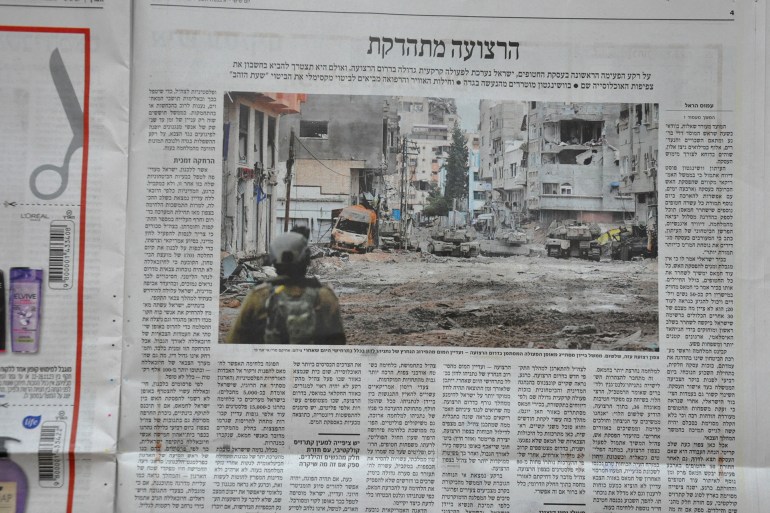Al Jazeera Net correspondents
Occupied Jerusalem- Despite the Israeli consensus on the necessity of liberating all those detained by the resistance in the Gaza Strip, military analysts’ estimates varied regarding the mechanisms for this and the course and developments of the war, amid assurances that the truce will have repercussions on the declared Israeli goals of the war.
As the truce entered its second day, Israeli military analysts unanimously estimated that the temporary ceasefire represented a victory for Hamas and a setback and an undermining of the declared Israeli goals regarding the war. This was in harmony with the estimates of political analysts who confirmed that the deal was binding, due to the “moral duty” towards the detainees in the Gaza Strip. Most importantly, because of the failure of Benjamin Netanyahu’s government to liberate them.
Political analyzes agreed that Israel does not receive the prisoners with joy and feelings of victory or accomplishment, but rather they are received in silence and with mixed feelings, which reflects the loss that the political level suffered before the Hamas movement, in light of being forced to accept a prisoner exchange deal after the failure of ground military operations to liberate them.
“We receive them silently.”
Under the title “We Receive Them Silently,” Nahum Barnea, a political analyst in Yedioth Ahronoth newspaper, wrote an article in which he pointed out that the war reached its climax as it entered its eighth week and the temporary ceasefire took effect.
He said, “The war on Gaza was fought by the Israeli army without restrictions, but when the ceasefire begins, many questions will be asked: Where is it heading, for how long, what are we doing here? And the word shuffling the cards that terrifies the political level and the army will return to Israeli discourse.” .
Behind the display of unity in the joint tours and press briefings of the War Council, Barnea says, “There are bitter and hidden disputes and discussions. The exchange deal was accepted reluctantly, as the military operations did not achieve their goals nor any achievement, and the return of a portion of the detainees was achieved through accepting the exchange deal and agreeing to a temporary truce.” “.
He explained that “there is no room for beating the drums of victory” because of the first phase of the exchange deal, pointing out that the messages that Netanyahu sought to promote, as if Israel had achieved a major achievement in the negotiations, are a claim that is “far from the truth,” adding, “Netanyahu prefers to bury his head in the sand. Discussing the issue of a ceasefire exposes his government to the risk of disintegration and collapse.”

Political concessions
The same proposal was adopted by Zvi Barel, an analyst for Arab and Middle Eastern affairs in Haaretz newspaper, who believes that the exchange deal may be an “insurance policy” for Hamas leaders from the assassinations that Netanyahu hinted at, noting that Qatar’s mediation in the talks with Israel demonstrated its strategic importance.
Confirming the decline shown by the political echelon and its acceptance of Hamas’s requests, the Israeli writer says, “There was the most interesting part that was omitted from the briefings of the political parties in Israel, according to which Israel agreed to transfer its military forces away from Salah al-Din Street, the central axis linking northern “Gaza in the southern Gaza Strip. This is the only crossing route for thousands of displaced people from the northern Gaza Strip.”
Contrary to what happened after the actual start of the truce, Barel says that Israel agreed not to approach or attack the displaced people and residents who will pass on the road, even if they are moving towards the north, during the days of the truce, adding that this “raises fears that Hamas members will move freely during the truce period.” They move without interruption between the two parts of the sector.”
He pointed out that the terms of the truce agreement clarify the difficult dilemmas facing Israel, especially with regard to the nature and duration of the ceasefire, as well as fears that the truce will give Hamas an additional period of time to organize its forces, noting that the return of the bodies of Israeli detainees has not been discussed yet.

Difficult days await Israel
For his part, the military analyst in the newspaper “Haaretz”, Amos Harel, believes that returning a portion of the detainees will not lead to an outburst of joy in Israeli society, pointing out that difficult days await Israel related to the continuation of negotiations to free more detainees, as well as the course of the war and its developments in light of the cessation of the war. The temporary shooting, and how this will be reflected in the future battle of the ground incursion into the south of the Gaza Strip.
The military analyst explained that there are still many obstacles in the way despite the temporary truce and the first phase of the exchange deal, as the Israeli side has not resolved the issues related to the declared goals of the war to destroy Hamas’ rule and military capabilities, and to liberate all Israeli detainees.
He pointed out that Hamas and the Palestinian factions are still detaining large numbers of Israeli civilians as well as military personnel, and therefore they will continue other war maneuvers, and will also escalate the psychological warfare directed against the Israeli public in order to reach a comprehensive exchange deal and end the war.

Tighten the rope to the end
On the military side, Yoav Limor, a military analyst in the newspaper “Israel Hayom”, believes that the Hamas movement will adopt a “tug of war until the end” policy to gain time in order to achieve its goals by seeking to prolong the ceasefire, in order to prevent the collapse of its rule in Gaza, and avoid the erosion of its power. Military, he said.
The military analyst believes that the deal is a necessary step on the path to achieving the Israeli war goals, saying, “The deal is a compromise between hopes and dreams and reality, and in the Gaza case, the stubborn reality of Hamas leader Yahya Sinwar.”
In an attempt to search for any achievement for Israel from the armistice agreement, Limor said, “Unfortunately, it was not possible at this time to achieve a better deal that would return the detainees to the country. As the negotiations progress, Hamas will increase its demands, and in parallel, the dilemma will deepen on the Israeli side.”
Regarding the dilemmas, the military analyst explained, “We are talking about possible exchange deals and perhaps a comprehensive deal, and the Israeli public must understand that we are facing a bitter situation that is being talked about and the release of the oldest Palestinian prisoners such as Hassan Salama, Muhannad Shuraim, Abbas Al-Sayyid, Ibrahim Hamed, and Abdullah Barghouti, and this is a nightmare for decision-makers in Israel.” .
It is believed that prolonging the days of the truce and extending it, which will be granted in exchange for the release of more Israeli and foreign detainees, gives Hamas the possibility of a ceasefire for a long period, and this puts Israel before a greater challenge that involves stopping the war.
#Analysts #Israeli #achievements #truce
2023-11-25 19:20:08


